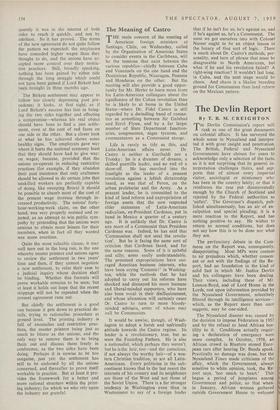The Meaning of Castro
THE main concern of the meeting of American foreign ministers at Santiago, Chile, on Wednesday, called by the Organisation of American States to consider events in the Caribbean, will be the tensions that exist between the various republics—chiefly between Cuba and Venezuela on the one hand and the Dominican Republic, Nicaragua, Panama and Honduras on the other. But the meeting will also provide a good oppor- tunity for Mr. Herter to learn more from his Latin-American colleagues about the significance of the Cuban revolution than he is likely to at home in the United States—where Dr. Fidel Castro is still regarded by a dwindling band of roman- tics as something between Sir Galahad and Errol Flynn, and by a far larger number of State Department function- aries, congressmen, sugar tycoons, and commentators as a Communist stooge.
Life is rarely as tidy as this, and Latin-American affairs never. Dr. Castro is neither a Garibaldi nor a Trotsky: he is a dreamer of dreams, a skilled guerrilla leader, and no end of a show-off. He has marched into the limelight as the leader of a peasant revolution against a leftish dictatorship based, as was that of Peron, on the urban proletariat and the Army. As a peasant leader, he is committed to the kind of land reform and expropriation of foreign assets that the now respected elder statesman of Latin-American radicalism, ex-President Cardenas, put in hand in Mexico a quarter of a century ago. It is unlikely that Dr. Castro is any more of a Communist than President Cardenas was. Indeed, he has said that 'Communism shall not steal the revolu- tion'. But he is facing the same sort of criticism that Cardenas faced, and for the same reasons. Some of it is spiteful and silly; some easily understandable. The promised expropriations have out- raged American business interests, who have been crying 'Commie!' in Washing- ton, while the methods that he had adopted to carry out his reforms have shocked and dismayed his more humane and liberal-minded supporters, who have also been vocal in their disillusionment, and whose alienation will certainly cause Dr. Castro to turn to more bloody- minded advisers, some of whom may ,vell be Communists.
It would be unwise, though, of Wash- ington to adopt a harsh and unfriendly attitude towards the Castro regime. Its leader is a revolutionary, true, but so were the Founding Fathers. He is also a nationalist, which perhaps they weren't, but he is the heir, too—and the conscious, if not always the worthy heir—of a wes- tern Christian tradition, as are all Latin- Americans. Every politician in the sub- continent knows that in the last resort the interests of his country and its neighbours are those of the West and not those of the Soviet Union. There is a far stronger tendency in Washington even than in Westminster to say of a foreign leader 'that if he isn't for us, he's against us, and if he's against us, he's a Communist. The mess we got ourselves into with Colonel Nasser ought to be an object lesson in the lunacy of that sort of logic. There is much about Dr. Castro's methods, per- sonality, and turn of phrase that must be disagreeable to North Americans, but what if he and his revolution failed? A right-wing reaction? It wouldn't last long, in Cuba, and the next stage would be chaos. And chaos is a likelier breeding ground for Communism than land reform on the Mexican pattern.


























 Previous page
Previous page